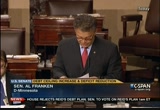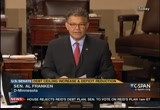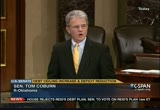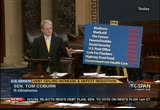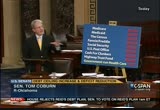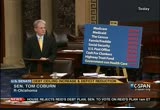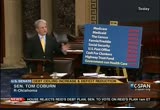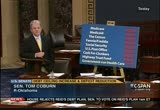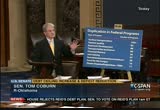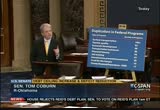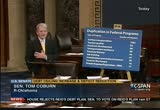tv Public Affairs Event CSPAN July 30, 2011 9:00pm-11:00pm EDT
9:00 pm
very, very conservative retirement account drop and plunge due to the inability of congress to come up with a plan for the debt ceiling. we trust your judgment as a senator, but plead with congress and the senate to come up with a solution. we absolutely cannot afford to see our retirement savings sink again like they did in 2008." and it's not just individual citizens. i received a letter from dakota county's administrator. reads in parkts "if the federal government does not resolve its fiscal issues in a timely and responsible manner, it will drive up costs to taxpayers here in dakota county. being able to borrow at the lowest possible rates has meant that our county's taxpayers have gotten mordz an better public facilities from libraries to senior housing to highway interchanges and saved hundreds of thousands of dollars for both property taxpayers and senior housing residents in the past
9:01 pm
several years alone. the city of chaska reached out to my office explaining that they are planning to sell debt in august to fund a street reconstruction program and refund their water treatment plant. if congress fails to act, these projects will come at a much higher cost to residents of chaska. i received a particularly compelling e-mail yesterday from a woman from falcon heights. she wrote, "i'm writing again to say i support the president and realize a need to compromise. it is scary for a 66-year-old retired school teacher who has medicare and social security, scary is a default and what it would do to the economy." that's advice from sue. sue gets t she gets that congress's failure to act may have a direct impact on her. but the impact is really for the
9:02 pm
whole economy. and sue is asking for us to compromise. and compromise we have. let me make one thing clear. leader reid's plan is a compromise. let me make another thing clear. house speaker boehner's plan is a tea party plan. harry reid's plan is a true compromise. it contains all spending cuts and zero revenues. during these debates, there have been lots of ratios floating around. senator conrad, the budget chairman, proposed a balanced and sensible flan had a one-to-one spend cut to revenue ratio. personally, i like that approach. president obama was negotiating a 4-1 or even 5-1 spending cut to revenue ratio. in the reid plan, there's no
9:03 pm
ratio. it's 100% cut cuts zero revenue. secondly, will contains dollar-for-dollar spending cults to match the debt ceiling increase. this is exactly what the republicans have been asking for. yesterday, this morning i learned that 43 of my republican colleagues have signed a letter to leader reid signaling their opposition to his proposal. why? well, they say that the savings from winding down the wars in iraq and afghanistan don't count. specifically, they say that these savings are -- quote -- "a widely ridiculed accounting gimmick that breeds cynicism." unquote. yet all but three of the 43 senators who signed this letter voted for the ryan budget on may 25 this year.
9:04 pm
that budget counted the same drawdowns as almost identical in savings. so those savings were legitimate enough to secure their support for the ryan budget but not legitimate enough to secure their support for leader reid's debt ceiling compromise. and here we are on the precipice, and suddenly they've done a 180-degree turn. either these savings count or they don't. you can't have it both ways. so we are proposing exactly what republicans have been saying that they want. yet instead of accepting this deal, they're using what precious time we have left to push forward with their agenda, and it's not even their agenda. it's the tea party agenda. their radical agenda is a wolf
9:05 pm
in sheep's clothing. last night we voted down speaker boehner's plan which requires the passage of a balanced budget constitutional amendment, a balanced budget amendment sounds, on its face, sensible, but in reality all of the current house proposals for a balanced budget amendment would have disastrous consequences for our nation. a balanced budget constitutional amendment would do permanent damage to our social safety net by slashing spending to 18% of g.d.p. that's what they all propose. we haven't had a spending ratio that low since 1966. and today's america is very different than 1966. we have a much older population. today we have a higher percentage of people drawing on social security and medicare benefits, more than ever before. health care costs are 15%
9:06 pm
higher, even during president reagan's 10-year spending average, 28% of g.d.p. what would an 18% cap really mean? let's use the republican study committee's budget proposed in april as an example. a budget like theirs is roughly what we would expect if we capped spending at 18% of g.d.p. their budget cut non-defense discretionary funding by 70% by 2021. like the ryan plan, the republican study committee's budget ended medicare as we know it, changed it into a voucher program and raised eligibility to 67. but it did it more quickly. their budget raised the social security retirement age to 70. it resulted in important programs like food stamps and medicaid getting cut by 50%. the republican study committee budget was the ryan budget on
9:07 pm
steroids, and i'd like to remind you of what happened to it on the house floor. this is an interesting story. because this story shows you just how extreme this budget was. most house republicans didn't actually want such a harmful draconian budget to be the official house budget. but many of them wanted to go on record to brag to their tea party support theirs they had slashed $9 trillion in federal spending p. so they scheduled a vote just as soon as democrats would vote it down for them and then they could just blame the democrats. well, the majority whip steny hoyer had an idea. moments before the vote, he asked democrats to vote "prese "present." this would leave the onus squarely on the republicans to vote it up or down. chaos erupted in the house.
9:08 pm
as republican the republica thep realized what would happen. too many votes had been passed in favor of the republican budget. the republican leadership got autumn inform their members to switch from "yes" to "no" and in the entdz 119 republicans voted in favor and 120 against. crisis averted. that's how bad this plan was. and a balanced budget amendment that caps spending at 18% would essentially do exactly the same thing. this is a perfect example of political posturing. we voted down speaker boehner's plan last night for that very reason. his plan wasn't about finding a real solution, it was all about political posturing. if it became law, it would subject americans to a very scary republican study committee
9:09 pm
reality. house republicans have shown that they don't really want that. the american people definitely don't want 5. the american people have clearly said that they want compromise. they want an honest effort to meet in the middle. sue from falcon heights is one of them. leader reid has responded to the pleas of the american people by offering us a sensible compromise. i urge my colleagues to be statesmen for the sake of the country. please, come to the table. we are trying to work with you. for the sake of the country, the clock is ticking. thank you, mr.ught out in the debate. when washington says it's going to cut spending, it's
9:10 pm
untruthful with the american public. because both the boehner bill and the reid bill increase discretionary spding over the next 10 years by one of them $830 billion and the other $832 billion. how is it that we can with a straight face in this body talk about a cut when in fact we're going to -- and c.b.o. says we're going to actually increase the spending in the discretionary accounts over the next 10 years nearly a trillion dollars. and you've heard the debate in the house, the senate of a sput. and of course, that goes to what the heart of the problem is in our country is words get twisted around to the advantage of the politicians, but to the disadvantage of the american citizens.
9:11 pm
we are in trouble financially. most people agree with that. we have programs that are in difficult straits. as a matter of fact, they're broke. they're not just in difficult straits. here's the ones that are broke. medicare part a trust fund, worst case scenario, this year, 2016. that's the fund that solves and pays for hospitalizations for our seniors. now, we've heard a lot of statements said about medicare. the average medicare recipient paid $130,000 into medicare. the average medicare recipient takes $350,000 out. how long do you think that can continue? how long can we continue to tell seniors that we can continue a program based on its utilization
9:12 pm
rates, based on its briermt rates, based on the tax rates, that has a $220,000 difference between what goes out in benefits and what comes in? it's broke. medicaid is broke. the reason it's broke, because the states are broke trying to take care of it. we mandate what they must do, and yet the states are choking on medicaid. and we're choking on matching the amount of dollars. and under the affordable care act, it is now estimated 25 million more people will go into medicaid. so it's broke. the census. it was broke before it started. cost twi what it did 10 years ago. $8 billion more than what was estimated. fanny and freddy, we know they're broke. $190 billion you have now committed f to pay to get them out of the hock.
9:13 pm
congress created that. $190 billion and that is where we are today. it's going to be $300 billion or $400 billion that we will have to pay. social security. people say it's not broke. we have $2.5 trillion worth of i.o.u.'s. the fact is that that money's gone, congress stole it, spent it on other things and now we lack the ability to go into international financial markets to borrow that money to put that trust fund whole. so why do we need to reform social security? so we can make sure it's there in the future. what we did know is in 2032 now, according to the trustees that everybody on social curity will onlyet 77% of what they're promised and ery year after thatt will decline. so that when my kids are on social security, they will get about 40% of what the average social security recipient gets now.
9:14 pm
and we know we can fix it and we know we can fix it and make it sustainable forever. but we won't do that because that's politically difficult. the u.s. post office is bleeding every day. yet we haven't fixed it. we're going to do a gimmick to buy it some time. but the fact is, is we've set it up under a system when they negotiate labor contracts under the arbitration system they can't consider the financial health of the post office. that would be like paying somebo to mow your grass and saying they'll set the price on it, and you can't negotiate what the price is. and yet they're going to lose $8 billion to $10 billion this year and more every year going forward. and yet we've not fixed it, not done anything. cash for clunkers. absolute, when you look at the dollars, and the homebuyer program, new homebuyer program, they actually had a negative effect on the economy.
9:15 pm
that's what the studies show now. so we blew all tough all that money. the highway trust fund. what is used to build highways and roads and bridges in our country is broke. we're looking for $13 billion to try to make it whole and all we did was transfer the last three years to that, rather than reform it, we didn't do anything about it. the new government-run health care programs. here's what we know. is the new studies show that over half of the employers in this country will drop their insurance for the people who presently havensurance at work. hundreds of billions of dollars of additional taxpayer money are going to be required to subsidize the exchanges that those people are going to go into. because the penalty for dropping somebody's insurance is economically too low to keep employers from doing that. so we have all these programs that are broke, and we have a
9:16 pm
discussion about the debt ceiling, but we're not talking about what the real problem is. is this government is twice t size it was 10 years ago. twice as big. and it would be great if all of it was constitutional, it could be great it was if it was all effective, if it was efficient and it would be great if we could afford it. but the facts we're where we are today with $1.6 trillion deficits because we can't afford the government we have. and so we've not concentrated on the very areas where we can find mutual agreement, we've had three bipartisan bills in here where we've cut money, significant money, a billion here, $5 billion here, $7 billion here, go through the senate with vast majority votes only to go nowhere. because the allowance for the debate on the underlying bills was stopped. the bills were pulled.
9:17 pm
so what do we do? well, the first thing we do is we look at what the problems are. what are the problems? we have a hundred different programs with a hundred sets of bureaucracies for surface transportation alone. why do weo that? why haven't we fixed it? that's a question the american people ought to be asking. we have 82 programs to improve the quality of our teachers run by the federal government across seven different agencies. only one of them is the department of education. why are we doing that? where is the assessment of how well they work? where is the metrics to say we should be spending this money in this way because we're getting return? not one of them has a metric on it. not one of them has ever been measured of whether or not it's effective. we have 88 economic development programs in four agencies for which we spend $6.8 billion and we have another 100 economic development programs in six other agencies for which we
9:18 pm
spent another $4 billio and not one of them has ever been measured to see does it improve economic activity. and if in fact it does, why do we have 188? separate agencies to speculate economic development. i mean this isn't complicated stuff. it's common sense. every american other than the congress would fix that. we he 56 programs to teach financial literacy to the american people. first of all, i'd question whether or not we ought to be teaching anybody financial literacy as a government when we run so poorly. but if in fact we do, why do we have 56 and, oh, by the way, not one of them has ever been measured to see if it effectively teaches somebody financial late reas. we have 47 job training programs, cost $18 billion a year, nine different agencies, nine different sets of bureaucracies, and all of them but three overlap with the other.
9:19 pm
that's according to the government accountability office. why? why would we do that? we have 18 programs for food for the hungry. that's something we all want to be involved in. 18? why 18 sets of bureaucracies? how well are they working? are they effective? could we do them better? the question hasn't been been asked by congress. we have homeless programs for both prevention and assistance, 20. six different agencies. so you have 20 different sets of bureaucracies that are designed to do the same thing. disaster response and preparedness, inside fema alone , inside fema alone we have 17 different programs. inside that one agency which is part of the department of homeland security. i asked the question why? why has it been a priority for
9:20 pm
us to work on those? why would you do? a senator: would the senator be willing to yield for a colloquy? it may surprise the senator, i hope not. but it might surprise some people listening to this. mr. kerry: to hear from this have side of the aisle a lot of people here have enormous respect for what the senator has been talking about and fighting for and what he has achieved. and i might add he is one of those courageous senators who has come together in the last months, working months as part of the so-called gang of six, to try to bridge the gap here. and see if we can't find a way forward. and as i listened him, there's an enormous amount of common sense in the questions that he's asking. these are questions all of us need to join into, and we need to join into them in a process that allows us to be able to
9:21 pm
fairly and in a balanced way work on the grand bargain, as you call it, the big fix. now, i'd ask the senator, because i think a lot of americans listening to this debate -- i've been listening to somewhat on the floor, somewhat back in the office -- and i think people have got to be saying to themselves, these guys are kind of talking past each other or something's being missed here, because you hear this side, some things sound reasonable, you hr reasonable things over here. so people say what's hanging up this process? why is the entire country being held hostage here? so i'd like to help my colleague if he'd kind of help us bear down on what we need to do here. and i'd ask him if it isn't fair and accurate to say that the so-called gang of six -- terrible name, i think, maybe we call them the g-6 -- came together with an understanding that we needed balance in the
9:22 pm
approach to satisfy both sides and build a critical mass. and that balance required cuts. you have to put the big items, the big-ticket items on the tae. that means fixing social security, reforming it for the long term, medicare, medicaid, unsustainable on the current paths. defense, we've got to find a handle on some of the procurement and expenditures. but we also -- and i think the senator joined in this -- have to close some tax loopholes and have tax reform and find some level of revenue at an appropriate ratio that allows us to fix this. and that's where the problem has been, that there are a group of folks over in the house who have just insisted no revenue at all. and what i'd ask the senator, isn't it fair to say that the gang of six came up wh a sort of more balanced approach on which i believe the senate could find the ground of compromise?
9:23 pm
what senator reid has proposed i believe has cuts that republicans have supported. maybe not quite enough yet so maybe we can negotiate that. mr. coburn: let me reclaim my time. mr. kerry: absolutely. mr. coburn: there are absolutely no cuts in either what senator reid or speaker boehner propod in the discretionary spending. the spending will rise $832 billion over the next two years -- ten years in the diretionary accounts. now, only in washington is that a cut. and, quite frankly, i'm willing to work with my colleagues. i've been out there. i say we have to move and eliminate some of these loopholes, that we have to reform the tax code. i'm willing to take the heat from my side on that. i don't have any problem. what i'm not willing to take any more is a senate that won't work on the details of the specific problems. and what i'm trying to do is to outline where the problems are.
9:24 pm
where is the -- and we didn't do it when we were in chae either, senator kerry. there's been a failure of leadership in this country, in this body to attack the very problems. when we have 47 job-training programs and none of them are working well, because that's what we do know, because the very few times they've been looked at, they don't work, and we're spending $18 bilon a year and we're not fixing them? the american people got to say, what is wrong with you all? so what -- what we have to do is we have to evaluate the effectiveness of every program in the federal government. we have to limit the overhead costs of federal programs. we've put ideas out there. this is $9 trillion worth of cuts. not washington cuts, american cuts, money you're not going to spend that's less than what we're spending today, not money you're not going to spend that you would have spent more the
9:25 pm
next year. this is real cuts. each one of these is in here backed up by the facts, not biased. you could disagree with where you would make the cuts but you can't disagree with the facts in here, because all the facts come from the congressional research service, the general accounting office, the office of management and budget, the president's budget in terms of his recommendations and why, and the c.b.o. we won't go there. my problem with the senate is we n't do our work. and we're as guilty. i don't -- this is not partisan to me. our country's future is at sta stake. and when we have two bills, one last night andne today, that is -- are literally lying to the erican people when they say "cuts," i think it's unconscionable. mr. kerry: would the senator further yield? mr. coburn: well, let me finish if i will, i will give you a chance and i will yield back to you in a moment. mr. kerry: very good. mr. coburn: the fact is, we
9:26 pm
won't tell the truth to the american people. and the first truth is, if we'll be honest with them, they will understand what the necessities that will have to be brought forward in this country to be able to solve the problems. by denying what the problem is, we will never get the consensus in this country and the embrace of the american people to do what everybody in this body ows is eventually going to have to be done. we will not have a medicare system that's like the medicare system we have today in five years. it is absolutely unsustainable. we will never be able to borrow the money to do it. we're going to get a debt downgrade no matter what we do. we will not be able to borrow the money. so rather than continue to be dishonest with the american people about the status of where we are, what weught to do is embrace them and call for the very this that made this country great, the sacrifice of the citizens of this country to rebuild the potential for our future, to re-create a renewal in our country that embraces the things that made us great, a
9:27 pm
true free enterprise system with a limited government that will actually allow people to be rewarded for hard work, their own blood, sweat and toil and get that back and have a government take a fair share of that. on theup side, it should be more. on the downside, it should be less. i agree. theuestion is, is will we do it? will we continue a charade to the american people, continuing to tell them we're going to cut $800 billion, $900 billion out of the discretionary budget when, in fact, we're going to increase it $832 billion? there's only $2 billion difference between senator reid's plan and speaker boehner's on discretionary spending and both of them are untruthful to the american people. both of them take the american people at a lap anday we can wink and nod at you and we can tell you something's that not true and we can walk out of here saying we spent less money. well, you're only going to spend less money than what we planned to spend, which was way too much in the first place, which was totally unsustainable as well.
9:28 pm
so let's just be honest with them. our deal is we don't have the courage to actually make the cuts that are listed in here. we don't have the courage to eliminate the waste. we don't have the courage to eliminate the duplication. why? because every one of these programs has a polical backing and we're politicians. and -- and unfortunately, too often we're that instead of statesmen. it's time for us, both sides, to lead this country, to lead the country in a vision of here's the real truth of our problem. now let's have a debate about what should be the number-one priority. how much should we spend on defense? should we continue to allow contracts to go way overrun? should we continue to allow requirement creep in contracts, not just in defense, in homeland security, in h.h.s.? we have the same problems we have in defense, we have in all the other big agencies. we buy $64 billion worth of i.t.
9:29 pm
every year in this country. and $37 billion of it is wasted, totallylown. why? an what have we done about it? not one thing. just go look at the high-risk list for the g.o. on i.t. every year that happens. the census bureau spent $600 million on a device that never worked, there was no penalty for the company that did it. we paid it anyhow. it was a cost-plus contract. and the reason it never worked is because we had requirement creep all the way through. we don't have any grownups making the purchases for this country. nobody with experience. so we're doing the wrong things at the wrong time. what we need to be doing is the right things at the right time for the right reason considering that we make sure we take care of those that need us to take care of them and then we demand participation of everybody else.
9:30 pm
we need to cap the total number of federal employees. not because we want to but because we don't have any other choice. and we don't have to let anybody go. just through attrition, we can downsize the federal government. we waste $15 billion every five years on managing properties in this country that we own that -- that -- they're vacant, and yet we're spending that money on them. but we can't get a real property bill through. how -- how -- how valuable to us is $ billion? we've got to sta paying attention to the pennies and the nickels and the dimes, and we won't do it. unnecessary government printings, including us. i've been trying to get the elimination of this for three years. there's millions and millions and millions of dollars we can save by not printing the copies of this every day that nobody
9:31 pm
looks to except i did see my good friend from illinois actually look at a vote last night. but he could have got it on-line out of his blackberry. the point is we're tearing down trees to print paper we don't need. how much time do i have left? the presiding officer: the senator has 8 1/2 minutes remaining on the republican side. mr. coburn: all right. [inaudible] mr. kerry: mr. president, i would just ask the senator again, what i'm trying to do is help us get out of this predicament we've got where we've got a couple of days before the united states defaults. everything the senator has said is worthy of inquiry, but isn't it true that if we could get -- i mean, part of the reid proposal and the boehner proposal proposes a joint committee that will be structured somewhat like a base closing commission that will reque the senate and the house to vote in expeditious fashion
9:32 pm
on these kinds of proposals, whatever the joint committee proposes, and if the joint committee doesn't succeed in proposing something, then hopefully either the gang of six or the simpson-bowles commission. so isn't it key now to resolving this crisis and not defaulting our ability to be able to come together on a sufficient trigger or some sufficient mechanism that guarantees we're actually going to deal with the things similar to what the senator is raising? mr. coburn: well, i would not disagree that those negotiations are going on as we speak. i'm not a party to them. i don't know if you are. i suspect the -- the -- the president pro tempore is, and we're not going to get to decide that. that's going to come to us for a decision. i don't -- look, i worked a long number of months with my colleagues from the other side of the aisle. i put my name on a bill that really doesn't fix it but it was something to get us moving, it's better than where we are today.
9:33 pm
i agree with you. but what i would tell you is that's not good enough. we are not good enough yet to where we need to be if we're actuly going to solve the problem. let me just finish going through this. we need to end no-bid contracts in this country. give you a specific example. before he left here, senator lemieux got through the business bill prescreening of payments on medicare payments so that we look -- rather than we pay them and then go chase the fraud, we got through aill that required the center for medicaid services to put in a program to look to see if they ought to pay the bill. and what did they do? they signed a cost-plus contract for $77 million with a firm that's never done that before and didn't take a particularred-price contract from firms that have already done it before.
9:34 pm
tell me how we let that happen, and yet it happened. and when we had testimony in our committee, they said it was a fixed-price contract tonal write back and say it wasn't a fixed-price contract. we need some common sense in our government. i'll finish this up real quick. we need to disclose the text and cost of legislation prior to passage. we need to identify duplicative government programs. we've done that. that's in here. there's hundreds and thousands of them throughout the federal government. we need to eliminate them. we need to mandate congressional oversight. that's where our leaders, i think, have failed on both sides. they haven't mandated the committee chairmen have to do the oversight that's required to solve this problem. we need to freeze the size of this government. we can't afford the government we haveoday. the debate is about what will happen in the fute, what will be the revenue increases, what will be the spending increases.
9:35 pm
but nobody's talking about decreasing the size of the federal government. we can't afford this government. we can't afford to continue to spend the money that we're spending. i'll close with this, if we continue to be less than straightforward with the american people about what we're doing here, about the reid bill -- the reason i wanted to debate the boehner bill is i wanted to make this point on the boehr bill. when we call something a cut of $900 billion, just because the c.b.o. says we're going to spend $900 billion less than what we were planning to spend but still $832 billion more than that we are spending now, that's not a cut anywhere except in washington. and we ought to admit it. if that's the best we can do, the american people need to know that's the best we can do.
9:36 pm
but we can't play the games anymore. have another colleague, i think, that would thraoeubg >> before the house vote, republicans told reporters they cannot support the senate's debt and deficit bill because of cuts to defense spending. the committee chair of california and other members of the committee take part in this 30-minute news conference. [captions copyright national cable satellite corp. 2011] [captioning performed by national captioning institute] >> good afternoon.
9:37 pm
i think it is afternoon. think you for joining us. i am the chairman of the house armed services committee. we have the chairman of both committees, the chairman of the veterans affairs committee. last night, for the second time, the house of representatives passed irresponsible plan to arrest the nation's spiraling federal deficit and avoid a government default. let me put this plainly, senator reid's plan would give full freedom to continue his domestic spending while doing nothing to address this out of control deficit. it makes it in significant reforms to the real problem of debt and entitlement programs,
9:38 pm
while hacking away at the dwindling resources needed by our armed forces to keep america safe. this president and senate allies have for three straight years tried to pay for massive increases in domestic spending on the shoulders of our troops. severing funding for our military by nearly half a trillion dollars. that policy has failed. art that has increased. our men and women in uniform have done too much for our safety, security, and freedom to be shortchanged by this president and his allies about. we owe them our liberty, but they treat them as just another number on the chalkboard. the impact on our trips has been nothing short of frightening. our navy fleet is eroding, the smallest it has been since 1916. we are down 50,000 man power
9:39 pm
since 9/11. the army and marines aren't separated from their families and use it -- are separated from their families and using hardware that has been chewed up by a decade of fighting. in 1990, the airforce had 42 squadrons. today they have just 39, and they averaged over 30 years of age, forcing constant maintenance to keep them in the air. these warriors have been woefully neglected too long. now i understand admiral mullen is over in afghanistan, visiting with some of the troops. the question they are asking, will they be paid if the default happens? as senator read it's plan passes, if we stand idly by while this administration pays down its domestic spending spree with the blood and sweat of our troops, our military will break. by accepting three long years of
9:40 pm
defense cuts, we have allowed ourselves to be distracted by the massive entitlement programs that are bankrupting the up country. that stops here with this committee. the budget that we submitted last night cancels' president obama's credit card. it creates the conditions necessary for businesses to flourish. it shrinks our government, and most importantly, it stops three years of neglect to our armed forces. thank you. now i would like to ask the representative from virginia -- we were talking about how hot it was -- from virginia, the chairman of our readiness subcommittee. >> i want to first thank the chairman for holding this conference. i think this is an important issue. over the last several weeks, we
9:41 pm
have heard a lot about the word compromise, but i think the american people realize that overlaid on any compromise is that we need to make sure that we're having common sense on whatever compromise we have. we did not understand why it is the democratic administration constantly believes we need to compromise our national strategic assets. many of us, when jimmy carter gave away the panama canal, scratched our heads and said that did not make common sense. and this administration started talking about reducing some of our missile defense systems, we said that did not make common sense. when we watched as we basically gave the space program to the russians and chinese, we said that does not make common sense. this takes the cake. when we are looking at it under $59 billion, if we let that go through, if we go quietly into the night with this kind of cuts
9:42 pm
-- $85 9 billion. we will preside over the dismantling of the greatest military the world has ever known. that is not just our words. we had a hearing this week where we had the vice chiefs. each one of them came up and said how devastating the cuts of that magnitude would be. at if we look at the marine corps, they said specifically they cannot meet the needs of the combat commanders today, but if they have to make these cuts, it will come out of personnel and will have to reduce their force structure and have a new strategy of how they tried to defend the united states. the army said that it would end up coming out of the force structure and they would have to reduce the forces that we have and we cannot sustain this kind of cuts. if you move to the air force, the general said an interesting thing. he recognized the growth of the
9:43 pm
chinese and where they are moving in terms of the development that they have. he said something very true and shocking to many of us. he said when the chinese say they will have 320 j-20's in five years, you better believe they will, and we better be ready. when we have these cuts, we are already taking a very old fleet and cutting back dramatically. when we look at the navy, we have the admiral who testified with the navy, how difficult it be to sustain cuts of this magnitude. already, the navy has a three- year $67 million shortfall and maintenance. the result is -- $36 7 million shortfall and maintenance. that is not acceptable in terms of ships. when you look shipbuilding plan that the pentagon has presented to us, they indicate we need a
9:44 pm
floor of 313 ships. the independent bipartisan panel said we need to have 46 ships. you pick the number, the current shipbuilding plant, according to cbo, will not get us to 313. it could drop to 270, or even as low as 170. at a time in the chinese today, first time in our lifetime, have more ships in there and maybe then we have been ours. we cannot afford to do that with these kind of cuts. that is why we have to take a stand and make sure we do not allow them to happen. thank you. >> now i would like to hear from the gentleman from florida, the man who commanded troops in war in the field. where is allen? >> thank you everyone for being here. three weeks ago i had the opportunity to go down and visit some of our soldiers at hunter
9:45 pm
army airfield. when i stood there and talk to the leadership of the combat aviation brigade of the third infantry division door recently returned back from operations in afghanistan, i heard things that sent a chill down my spine. commanders told me we're starting to have to budget put the paper in the barracks. that reminded me of the times i was at fort bragg as the battalion executive officer and i had to do the same thing. it reminded me of the times when we had to identify either race vehicle or howitzer or piece of equipment that we had to take part to keep up the pieces of equipment equipped because we do not have the spare parts necessary. it reminded me of a time when we did not have the artillery or ammunition to properly train our troops. it reminded me of a time when friends of mine were an armored units and said they had to park their tanks and used golf carts. to remind me of a time when i deployed in iraq into doesn't 3
9:46 pm
and we did not have enough body armor -- and 2003 and we did not have enough body armor at latitude the driver. thank god when he was shot in the chest, he had the right type of body armor. i stand as a congressional representative. having lived through those times in uniform, i will not turn my back on the service members, some of them who are my friends, one of them my nephew. i will not turn my back and allow them to have to suffer and go through the types of things we had to go through just so we could have midnight basketball programs brought forth from the administration. it says in our constitution one of the responsibilities of the federal government is to provide for the common defense. perhaps the president should have thought about this and all of these budget cuts before he committed us to an operation in libya, where we are wasting precious american taxpayer
9:47 pm
dollars. this is not acceptable to me and i will not allow the greatest military that the world has ever known, a military that my father served and in world war ii, my older brother served and in vietnam, and i gave 22 years of my life to serve and, i will not see it destroyed. i will not support to rebuild because of the incredible, unconscionable cuts this brings forth to our military budget. for those of you who do not remember, you looking at a person who before he was sworn in talked about places where we could cut the defense budget. it is not about wholesale cuts, just the same as we found three wistful department of defense spending programs and without them eliminated. that is what we need to do instead of having across the board major cuts. we cannot afford to send men and women five times in the combat operations without proper training and equipment.
9:48 pm
thank you very much. >> we have also with us the chairman of the subcommittee on defense appropriations, mr. bill young from florida. bill? can you tell them what the program would do to the military? >> i think you have covered that well. i apologize for being late. there was an accident on the highway. my comments will be brief. chairman mckeown and i work together ever since we have both become chairman in this congress. we are determined that we will provide for the national and we will make savings were weekend. this year, the defense appropriations subcommittee reduced hr-1, the so-called c.r., last year's defense
9:49 pm
appropriations bill, by $18 billion. the bill that would just passed in the house for fiscal 2012 was reduced by $18 billion. we're working to save where we can, but we made very sure that we did not make any reductions that would affect our readiness or that would affect anybody serving our military. that is a commitment that we have and that is a commitment we will keep. part of that will be voting against the reid proposal. our investment in our nation's defense and the men and women who wear the uniform and provide the nation's defense should not be some magic political number. it should not be pulled out of a hat, and not decided on can we get the votes? it should be decided on what is the threat, what is it that the
9:50 pm
united states of america is going to have to do to maintain our security and to provide the equipment that alan was talking about to make sure that when that soldier needs some equipment, that is available. that is my commitment. we have kept that commitment. i would tell you that it is a real pleasure for the tremendous spirit of cooperation that exists between the defense appropriations subcommittee and the armed services committee under chairman mckeown and the outstanding members of both committees. thank you very much. good to see what this morning. >> any questions? yes? >> can you compare the bill passed in the house yesterday and the senator read a proposal -- and the senator reid
9:51 pm
proposal, specifically as relates to the military? >> we have a chart that shows that. i cannot see that. can you see it? you have copies, right? maybe you could just follow along. on the top line, that is the budget that was submitted to us a year ago, february, from the president. the numbers and those columns are what would be spent in defense over the next 10 years. then if you follow down, the fourth line, the ryan budget that we passed earlier. as has been stated by chairman young, we have made cuts we have made cuts in defense. in fact, if you look at the line budget of the the next 10 years, from the president's some middle a year ago, we have cut $315
9:52 pm
billion out of defense in the next 10 years. then you go down to the appropriations bill, we have actually cut -- and this is what we did it -- we took all of these numbers, to compare them apples to apples, the cost of living increase is spread out. we cut $439 billion. we are saying that is it. we gave at the office. if you look at the reid budget, billion, which is another $400 billion over and above. the budget that was passed yesterday, the boehner bill, would freeze are spending at the level that was passed last year and next year.
9:53 pm
so what we're looking at, to we have a balanced budget, we can only control the two year cycle in each congress. that is what that bill would do. yes? >> the wall devoted to it -- you all voted to cut cap and balance. the senate version. spending into five, six different paths. they were not as specific as to different areas, which the senate bill was. mr. young, you shed that -- you said that it should be based on what the need is. square for me that you cannot just have an across-the-board cut, as you are suggesting here. >> what we're looking at is going out eight years. when we actually dig into defense budgets, annual budgets that we vote on that become law,
9:54 pm
the authorization bill and the appropriations bill -- we understand what the environment here will be. we are passing our bills. the senate does not. we will end the in c.r., and then we will negotiate. we have a bottom line we will not go below on defense, and we will fight those battles as we go. yes, sir? >> is there any combination of cuts that you see coming from the senate democrats that he would negotiate over? >> there does not seem to be a lot of negotiating. our speaker has tried since the first of this year, the first time he met with the president, he told him that we wanted to -- we would help him, because he asked, he wanted us to extend the debt limit. the speaker told him at that time, we will do that, but only if we have corresponding cuts in
9:55 pm
spending. he has been trying all year to negotiate. when he gets right up to the line, they moved the line. it is been very difficult. i understand we are down to crunch time and that there will have to be something negotiated, and we will work that out hopefully before monday. yes? >> mitch mcconnell and the senate is the one representing republicans in this negotiations in the senate. they're now working on some sort of senate proposal. what is your message to mitch mcconnell in terms of where you are willing to compromise and where you are not? whether it is defense or otherwise? >> we all are on the defense committee, authorizing and appropriations. we will not cut below this line, $439 billion.
9:56 pm
where we got here, secretary gates a couple years ago was talking about we could not go below a 1% increase in the future over inflation. then he came up, i think he saw this train coming down the tracks and was trying to be proactive, he came up with asking the service chiefs to each cut $100 billion, totaling $100 billion, and they would find efficiencies and use that in places that were more important. they did that. when they came to was to explain this to us, he said, without another $78 billion. that's $78 billion, took out the percentage of overall inflation had been talking about a few months earlier, and said we will cut the force, marines and army, by 47,000 the fifth year, but that is the end, we cannot go more because it will have to come out of the forced. as allen said, we have men and
9:57 pm
women who have been deployed 5, 8 -- i talked to a marine that was heading back to afghanistan for his ninth diplomat -- ninth deployment. this is just wearing our service people out. we said that is it. then the president gave a speech and said we need to cut another $40 billion. -- another $400 billion. >> the chairman has asked me to look at this from the readiness point of view. in the senate, they want to argue and compromise over numbers. we are not looking at numbers, we're looking at changing the system. the reason that is important is what german young said, and please don't miss that. if you look at the national defence of this country, there are four questions that have to be answered. the first is simply this, what is the true risk assessment? what is the threat to the united
9:58 pm
states of america? it is crucial that we ask that question and we ask it accurately. the second question that has to be asked and answered is, what are the resources are combat commanders need to fill the mission's necessary to defend the united states of america from those threats? the third question, how can we get those resources and the most efficient means possible? the fourth is, what can we afford to spend and what is the risk we assume if we cannot spend those moneys? here is the crucial issue -- the only thing the administration and senate has been asking is part of question no. 4, which is what do they think we can afford to spend and what do they want to spend? they have not been putting on the table and asking, what is the risk that the united states of america semmes it wouldn't -- assumes if we cannot supply the resources necessary for our
9:59 pm
combat commanders? what we're saying is this, we're not going to go there. we're on to make sure that we are asking all four questions, because that is the only way we can defend this country. with those, we cannot compromise, asking those questions, because we cannot change the risks that the country faces. >> yes? >> your4 sank your39 billion, you don't want it -- you are saying that $439 billion, you did not want to go through that. >> when chairman young gets in these negotiations on the c.r. and its downs with his counterparts in the senate, he will fight to keep that line, i am sure. you want to say any more?
10:00 pm
he just had an operation. in the hospital, they dropped them. -- a drop him. >> what we have to accomplish is with the senate. normally, on defense issues, the senate is usually investing less than the house is prepared to do. in the house, we are bound by our 302-b appropriations, as determined by the budget resolution itself. .
10:01 pm
10:02 pm
it's been found more difficult all the time. the slush funds have been used. we continue to work. you should be. the members of congress would be very happy with this committee and my committee because we don't play politics. it's strictly what is good for the country and our neighbors's defense and the men and woman that provide that nation's defense. >> we've seen reports that the war could cost upwards of $3 trillion when it is all said and done. i wonder if sustaining the military force, if you would
10:03 pm
support the ref now raisers that target those costs specifically. when you support tax, none of us have ever been asked. >> you can always send in more to the treasury, if you like. i encourage to do that if you feel that way. we will not support a tax increase. we think the problem isn't that we need more taxes, we need to cut the spending, we've had run away spending, if we cut the whole defense budget and the whole rest of our things we actually get a chance to vote on, we would be running a deficit. the real problem is the courage to address the entitlement program. if we could cut the unemployment
10:04 pm
10:05 pm
10:06 pm
must be bipartisan and have support of both parties. not just one part of one party. this are multiple ways to resolve this problem. congress must find common ground on a plan to support both parties in the house or sthat and has to be a plan i can sign by tuesday contracts we've signed with thousands of citizens. if we don't, we could lose our country's triple a credit rating
10:07 pm
because we didn't have a triple a political base so handle it. a lower credit rating could be a tax increase on everybody. we all pay higher interest rates on mortgages, car loans and credit cards. that would be entirely self inflicted by washington. the power is stop this is in our hands. it needs a simple vote. done 18 times under president reagan, seven times under george w. bush. it must be done again now tchltz not a vote that allows congress to spend more money. it gives our country the ability to pay the bills congress has already racked up on monday
10:08 pm
night, i ask you to make your voice heard in this debate one email we received was from a woman named kelly smith. i keep my home clean, i work hard at a full time job and give my parents any money i can so they can afford their medications. i pay my bills. i'm a responsibly person. all i'm asking is that you be responsibly. i'm asking that you get yours the same way. in washington, you need to get your house in order. some senate republicans are listening now all of us including the republicans and house of representatives need to
10:09 pm
demonstrate the responsibility. the time for comprimise on behalf of the american people is now. good morning. >> by now most americans know lawmakers are engaged in a difficult debate the debt ceiling is currently set at a little more than $14 trillion. the congress and president don't reach an agreement by this coming tuesday, the treasury secretary tells us we'll no longer be able to pay all its bills. the consequences of miss thissing deadline could be severe because washington barrows so much money spending would have to slink by 40% quickly.
10:10 pm
markets would likely respond we have tried to work with democrats we need them to work with us. the reason spending is a problem is because of run away spending. without making the spending reductions would be irresponsible. with the crisis rolling across europe, we know it's only a matter of time before america can sustain its huge and growing debt. if we don't do something now, the scenes we've seen playing all across europe could happen in america. if we don't change the way washington operates, we'll not get control of our government or future we hope this could be an
10:11 pm
10:12 pm
from middle americans and not just on the wealthy. this is the wrong medicine for our struggling country. president obama admitted you don't raise taxes in the middle of a recession. 14 million are looking for work. the unemployment rate today is 9. 2%. we got more bad news yesterday. our economy grew at a rate of 1. 3%. the first quarter growth was downgraded to four tenths of 1%. raising taxes would only make this worse we must solve our
10:13 pm
debt crisis. no one will get everything they want. surely we can reach an agreement that will increase the debt ceiling, oppose account ability and begin reducing the size of our federal government that may not be what some want but what americans and the economist really need. >> tomorrow, tae party amy kremer talks about the tae party. jeff flake talks about the status of the reduction plan and talking about what happens if the u.s. key faults and the impact on con fumers.
10:14 pm
10:15 pm
here is the house floor debate. this is an hour and ten minutes. the speaker pro tempore: for what purpose does the gentleman from california rise seek recognition? mr. dreier: mr. speaker, i move to suspend the rules and pass the bill h.r. 2693, to cut spending, maintain existing commitmentand for other purposes, as amended. the speaker pro tempore: the clerk will report the title of the bill. the clerk: h.r. 2693, a bill to cut spending, maintain existing commitments and for other purposes. the speaker pro tempore: for what purpose does the gentleman from massachusetts rise? >> parliamentary inquiry, mr. speaker. the speaker pro tempore: the gentleman will suspend. the gentleman will suspend. the house ll be in order. the house will be in order. the gentleman has the right to be heard. the gentleman from massachusetts will state his inquiry. mr. mcgovern: mr. speaker, is it true that a bill considered under suspension of the rules denies the minority party the right to offer any amendments or even a motion to recommit?
10:16 pm
the speaker pro tempore: a motion to suspend is not liable to amendment on the floor. mr. mcgovern: further parliamentary inquiry, meerks. the speaker pro tempore: the gentleman will state his parliamentary inquiry. mr. mcgovern: is it true that it requires a 2/3 supermajority vote in order for a bill to vote? the speaker pro tempore: under rule 15, a motion to suspend it will have 2/3, a quorum being present. mr. mcgovern: further parliamentary inquiry, mr. speaker. the speaker pro tempore: the gentleman will state his inquiry. >> the house is not in order. the speaker pro tempore: the house will be in order. the gentleman from massachusetts. mr. mcgovern: is it also true, mr. speaker, that a bill considered under suspension of the rules does not pass if it receives a simple majority vote but not 2/3 of the ve? the speaker pro tempore: the gentleman is correct. mr. mcgovern: and further parliamentary inquiry, mr. speaker. the speaker pro tempore: the gentleman will state his inquiry. mr. mcgovern: does this mean that speakeroehner's bill to
10:17 pm
raise the de limit and to destroy medicare would have failed if it would have been considered under suspension of the rules yesterday? the speaker pro tempore: the gentleman has not stated a quirequoir. mr. mcgovern: thank you, mr. speaker. the speaker pro tempore: pursuant to the rule, the gentleman from california, mr. dreier, and the gentleman from massachusetts, mr. mcgovern, will each control 20 minutes. the chair recognizes the gentleman from california. mr. dreier: thank you, mr. speaker. i ask unanimous consent that all members may have five legislative days to revise and extend their remarks on this measure and i ask unanimous consent to revise and extend my remarks. the speaker pro tempore: without objection, so ordered. mr. dreier: mr. speaker -- the speaker pro tempore: the gentleman from california. mr. dreier: i think this is the first time that i've offered a reid proposal in the house of representatives. and one might ask why it is that we are here doing this, and it's very apparent to me why it is that we're here doing this. and that is we want to ensure that next tuesday we see an increase in the debt ceiling so the social security checks go
10:18 pm
out, we have -- we bring about spending reductions and maintain the credit rating of the united states of america and do everything that i believe that both republicans and democrats alike want to have take place. as you know, mr. speaker, we have passed from this house two measures withithe last two weeks. the cut, cap and balance measure and just last night the boehner proposal which as we all know stem from a bipartisan meeting that he had exactly one week ago this afternoon in his meeting with senator reid right down the hall. and unfortunately mr. rd no longer supports the proposal that we passed last night, and senator reid has said on several occasions that his plan is the onlplan that can pass both houses of congress. now, five minutes ago senator mcconnell once again asked senator reid to bring up this
10:19 pm
plan that senator reid said was the only one that could pass both houses of congress and senator reid said no. thursday night i introduced this measure of senator rd's and was askein the rules committee yesterday by mr. mcgove whetheor not we would bring it up and i said we didn't plan to. but the fact is senator mcconnell, having made the request now at least twice in the other body to have it brought up, asked us to raise this measure here and that's exactly what we are doing. now, if we look at where it is th we're headed, we all want to have a bipartisan compromise that will ensure that on tuesday we see that increase in the debt ceiling take place and do these other things. that's what the speaker of the house and the democratic leader of the united states senate, along with leade mcconnell,
10:20 pm
leader pelosi discussed a week ago today. and as speaker boehner said from the well last night, this was an agreement which was supported by senator reid. but things have changed, things have changed, we know that. but there is one thing that has not changed. and that is we have to act as quickly as possible. we need to come up with a compromise and you know what? since senator reid happens to believe that his measure is the only one that can pass both houses of congress, are going to let him know when we defeat it here in the house of representatives that it is not the plan that can gain broad support in the house and the senate. and so for that reason, mr. speaker, we are bringing this up , we, i believe, should have an opportunity for every member of this house to go on record on
10:21 pm
this issue and i'm going to urge my colleagues to vote no on this proposal so that we can come together with an important bipartisan compromise to achieve the goal that we all say that we share and with that, mr. speaker, i reserve the balance of my time. the speaker pro tempore: the gentleman from california reserves his time. the gentleman from massachusetts, mr. mcgovern, is recogniz. mr. mcgovern: yield myself three minutes. the speaker pro tempore: the gentleman is recognized. mr. mcgovern: mr. speaker, this process has become a joke. it is a disgrace. it an insult to the american people. i would say to my friends on the other side of the aisle, now is the time to act like grownups. this is the time to put our country before your political party. this is the time to put our country before the tea party. this is the time to do what's right. today you are bringing up the latest version of the reid plan. under not only a closed rule but under the most restrictive process we have in the house. usually reserved for noncontroversial bills.
10:22 pm
this is a $2.5 trillion bill being brought up uer the same process that you bring up bills naming post offices. 20 minutes of debate, no amendments allowed, we're not even allowed to offer a motion to recommit to where you need a 2/3 supermajority. under this process your own bill would have failed. that's right. if your bill were brought up under this procedure, yourill would have lost last night. mr. speaker, the only bill we should consider on the house floor is one that has been agreed to by the house and senate leaders and the president of the united states. so why are we doing this today? let's be honest, you're doing it to score some cheap political points. i would like to remind the speaker of the househat he's the speaker of not just the republican party but that he's the speaker of the whole house. now is a time to bring us together, nottary us apart -- not tear us apart. maybe the reid bill is the one that can unite us because it achieves tremendous savings without decimating medicare, dicaid and social security. ut, mr. speaker, to bring it up
10:23 pm
under this process is cynical and it demeans the house of representatis. i would say to the republican leaderip, enough political stunts. our country is facing a terrible economic crisis. a crisis that you created and one that you can avoid. but we've run out of time. now is the time for leadership, not bad political theater. now is the time to be to behave like legislators. please rise t the occasion. te reid bill is not the bill i would have written. it's not the truly balanced approach that i would have hoped for. there are no revenues in this bill. but i think it's the best approach that is on the table right now. and i'm willing to compromise. so i will vote yes on this bill. i'm willing to put my country first. i reserve the balance of my time. the speaker pro tempore: the gentleman from massachusetts reserves.
10:24 pm
members are advised to address their comments to the chair. not to other members. the gentleman from california, mr. dreier. mr. dreier: at this time i'm happy to yield such time as he may consume to the distinguished former chairman of the committee on appropriations, my friend from california, mr. lewis. the speaker pro tempore: the gentleman from california, mr. lewis, is recognized for as much time as he wishes to consume. mr. lewis: mr. speaker, if it were not for the remarks of my collgue from california as well as his colleague from the rules committee, i wouldn't be making these remarks. i'll begin with a quote. the facts that we are here today to debate raising america's debt limit is a sign of leadership ilure. increasing america's debt weakens us domestically and internationally. leadersh means that the buck stops here. instead washington is shifting the burden of bad choices today onto the backs of our children and grandchildren.
10:25 pm
america has a debt problem and a failure of leadership,mericans deserve better, unquote. senator barack oba, march of 2006. by 2009 senator obama had become president obama. in two years since he became president, federal spending has increased by over 5ds00 billion a year -- $500 billion a year. in the past two years he has added nearly $4rillion to or ntional debt. now president obama is in favor of increasing the national bt limit. when, oh, when will the real barack obama stand up? i yield back. the speaker pro tempore: the gentleman from california yields back his time. the gentleman from massachusetts is recognized. mr. mcgovern: thank you, mr. speaker.
10:26 pm
i yield three minutes to the distinguished gentleman from maryland, the democratic whip, mr. hoyer. the speaker pro tempore: the gentleman fr maryland is recognized for three minutes. mr. hoyer: i ask unanimous consent to revise and extend. the speaker pro tempore: without objection, so ordered. mr. hoyer: mr. speaker, my colleagues, our neighbors, our friends sent us here to be responsible and to come to the aid of our country at a time of crisis. our country is at such a time now. our peop confront uncertainty and fear and they're looking to us, looking to us for the courage to compromise and act to prevent default and to prevent gridlock and irresponsibility. yesterday we learned that
10:27 pm
investors in american stocks lost more than $400 billion when just a few days ago speaker behner said he could not compromise with president obama. now we're standing -- notwithstanding the remarks of my friend from california, the chairman of the rules committee, who talks about a bipartisan compromise, i tell my friend, you have not moved a single centimeter towards compromise with our side of the aisle. not asingle centimeter. and what do we see in the united states senate, my friends? we see a majority leader of the united states senate who has the president with him, so, yes, you control 1/3 and you control over 40%, so you can stop things from happening in the senate, but the people aren't looking to us for
10:28 pm
what we can stop. they're looking to us for what we can do. for what we can do to make our country healed at this point in time. so what has senator reid done with this bill that you introduced, guaranteed to fail? this is the second time you've put a bill on the floor to extend the debt limit guaranteed to fail. it is a pattern, frankly, i is a -- i say to you, my friends, and it's a pattern that the american public ought not to count on. what senator reid has done is he's taken the view of the speaker boehner and leader cantor and said, we need a long-term solution. and then he has compromised notwithstanding the fact that all of us on this side believe that the wealthiest amonus should help take us out of this crisis and not rely on the most
10:29 pm
vulnerable among us. and so there is no revenue in senator reid's bill, notwithstanding the overwhelming numbers of us on this side of the aisle believe that's good poli. and i know that some of you on your side of the aisle believe that as well. senator reid has set up a ocess so that we can continue to look at what we know we need to looat, bringing our deficit and debt down for which we are all responsible, my friends. i thank the gentleman. so we confront this moment of responsibility. i believe my side of the aisle will overwhelmingly say yes, not beuse they like this bill but because they believe it is a compromise that can work. because it takes so much of the demands that you have made on your side of the aisle, but if you ca to congress expecting perfection, if you came to
10:30 pm
congress expecting only that you do it your way and no other way, you will be disappointed. as all of us are disappointed because it cannot happen that way. our founding fathers brought us from many places with many perspectives to try to heal our country and provide for the general welfare. let us avoid default. let us set ourselves on a path of compromise. my friends on the republican side of the aisle, we're going to vote for the most part for this bill. we do not believe it's perfect. but we believe it's possible. america expects us to do that. the summer soldiers and sunshine patriots will retreat at this time of crisis. do not do that. i yield back the balance of my time. mr. dreier: i yield my friend an additional 15 seconds. the speaker pro tempore: the gentleman yields back the
10:31 pm
balance of his time. the gentleman yields back the balance of his time. the gentleman from massachusetts reserves. and the gentleman from california is recognized. mr. dreier: mr. speaker, i will say that i was prered to engage in a colloquy with my good friend from maryland and explain to him that if senator reid believes that this is a great compromise why will he not respond to senator mcconnell's repeated requests to bring it up in the unitestates senate? and with that, mr. speaker, with that, mr. speaker, i'm happy to yield one minute to our presidential candite, our good friend from still water, minnesota, mrs. bachmann. the speaker pro tempore: the gentlewoman from minnesota is recognized. the house will be in order. mrs. bachmann: thank you, mr. speaker. throughout this debate over guaranteeing insane never-before-seen in the history of this country levels of spending, president obama has coolly stood on the sidelines,
10:32 pm
his arms crossed, very simply castigating republicans for not giving him a $2.4 trillion blank check. meanwhile the only plan that the president has put forward is his february budget which in itself contained yet one more $1.5 trillion deficit. the president has no plan. only the republicans have offered plans. now is the time for the president to show leadership and the only leadership that he's showing is one that's saying,ities ,ities ,ities -- saying, tisk, tisk, tisk. we call on the president of the united states to finally engage in the process. and i yield back. the speaker pro tempore: the gentlewomafrom minnesota, mrs. bachmann, yields back. the gentleman from california reserves. the gentleman from massachusetts is recognized. mr. mcgovern: mr. speaker, let me just remind the gentlelady that no one on the democratic side ever walked out of a meeting.
10:33 pm
at this point i'd like to yield one minute to the gentleman from michigan, the ranking member of the ways and means committee, mr. levin. the speaker pro tempore: the gentleman from micgan is recognized f one minute. mr. levin: i ask unanimous consent to revise and extend. the speaker pro tempore: without objection, so ordered. mr. levin: i've been here almost 29 years. this is a disgraceful moment. this country wants compromise. what you're doing with this bill is to undermine the chances of compromise. that's what you're doing. you're trying to throw a monkey wrench in the reid bill before it can even leave the station. that's what you're doing. you're trying to make sure that the senate cannot work its will. why isn't this bill being brought up? because senator reid wants to sit down with senate republicans and work out a compromise and you're bringing up this bill to make sure that this will never happen, this is a disgraceful moment, mr. dreier, it is a
10:34 pm
disgraceful moment. mr. dreier: will the gentleman yield? mr. levin: no. mr. dreier: madam speaker, may i yield time to my friend? may i yield time to my friend from michigan? am i allowed to yield time to my friend? mr. levin: mr. dreier, you have always spoken and the -- mr. dreier: i am the author of this measure. the speaker pro tempore: the gentleman has not been recognized. mr. levin: i want you to yield to me. mr. mcgovern: i yield the gentleman 15 seconds. mr. levin: mr. dreier, it's clear what you're doing here. mr. reid wants to sit down and work with mr. mcconnell. what you're trying to do is make sure that a signal is sent to the senate, don't bother, we're going to -- mr. dreier: will the gentleman yield? mr. levin: yes. mr. dreier: i say the action we are about to do here tod is see the process that senator
10:35 pm
mcconnell and senator reid work together. why? mr. levin: i take back my time. mr. dreier, that is pernicious nonsense. the speaker pro tempore: members are reminded to address their comments to the chair, not otherwise. the gentleman from california. mr. dreier: i didn't hear you, madam speaker. the speaker pro tempore: i said members are reminded to address their comments to the chair and not to others. mr. dreier: i will not only address you, madam chair, i won't point my finger at you as i address you. the speaker pro tempore: thank you. mr. dreier: let me say, madam speaker, that senator mcconnell has just minutes ago asked senator reid to bring the reid proposal to the floor of the united states senate and a decision has been made by senator reid not to bring the measure up. on at least three occasions senator mcconnell has asked since senator reid has said that his proposal is the only
10:36 pm
one that can pass both houses of congress, senator mcconnell haasked us to show what we all know and had a is there is not going to be a majority of support in the -- all know and there is not going to be a majority of support. we look forward to the discussions that will take place between speaker boehner, senator reid, leader mcconnell, leader pelosi. and with that, madam speaker, i'd like to yield 30 seconds to a hardworking new member of congress from indiana, mr. young. the speaker pro tempore: the gentleman from indiana is recognized for 30 seconds. mr. young: thank you, madam speaker. we need to cut spending now. we need to control spending in the future. but the american people understand that our foremost constitutional duty here in congress is to make sure that america is safe. former secretary gates said that further cuts to our milita will mean there are certain things our military won't be able to do and places they won't be able to go. this proposal, the reid-obama
10:37 pm
plan, proposes to cut spending by $859 billion or 10 years compared to the president's fiscal year 2011 budget. yet, the president and senator reid has told us which places won't be going and which missions we won'ting doing. it's irresponsible. i can't support this proposal. the speaker pro tempore: the gentleman's time has expired. the gentleman from massachusetts is recognized. mr. mcgovern: madam speaker, at this time i'd like to yield one minute to the gentleman from texas, a member of the committee of the ways and means, mr. doggett. the speaker pro tempe: the gentleman from texas is recognized for one minute. mr. doggett: this republican ploy is too clever by hat. at the very same time republican senators are filibustering against bringing up this proposal in the senate. the house republicans are insisting on bringing it up here so they can vote it down. while it is imperfect and imbalanced, this reid proposal protects educational opportunities for college students, it protects retirement security through medicare and social security, and it provides more important resources r public services
10:38 pm
than the reactionary house republican budget. with house republicans still at fault for refusing to seek any type of middle ground, the reid bill is the least rse alternative to avoid default. as desperate as they were last night, to cobble together a handful of votes to pass a partisan boehner bill, they are even more desperate to defeat this reasonable middle ground because they insist it must have 2/3 votes in this body. let us join democrats in unity to approve this proposal. the speaker pro tempore: the gentleman's time has expired. the gentleman from california. mr. dreier: madam speaker, i yield myself 10 seconds to remind my friend from texas that the measure we voted on last night stemm from the bipartisan agreement that was put together one week ago this afternoon right down the hall. and with that m happy to yield one minute to my good friend from jefferson, louisiana, mr. scalise. the speaker pro tempore: the gentleman from louisiana is
10:39 pm
recognized for one minute. mr. scalise: i thank the gentleman for yielding. if you look at the reid bill it doesn't even start to address the problem. with all of the budget gimmicks and shell games, people would recognize if you have an honest conversation it doesn't even start to tackle the spending problem. now, hardworking american families back home know the problem in america is not we got corporate jet owners and millionaires and billionaires, the problem is that washington spends too much money. you don't solve that problem by sending more money up to washington to spend even more. and so when the president talks about a balanced approach, what he really means is more job-killing tax hikes. families back home know what we really need is a balanced budget amendment to put accountability back in place in washington, to control this rampant out-of-control spending in washington and to finally attack the real problem and that's washington spending. i oppose the bill, and i yield back the balance of my time. the speaker pro tempore: the gentleman yields back. the gentleman from massachusetts is recognized. mr. mcgovern: thank you, madam speaker. i yield one minute to the gentleman from new jersey, mr. andrews. the speaker pro tempore: the gentleman from new jersey is
10:40 pm
recognized for one minute. mrandrews: i ask unanimous consent to revise and extend. the speaker pro tempore: without objection. mr. andrews: madam speaker, this agreement offers the calm reasonable compromise the country wants. most americans don't want to let the debt ceiling expire. this bill solves that problem. most americans say, you know what, you probably could cut about 5% in most government programs. not everybody believes that, but that's what this bill does. most americans say there ought to be some other way to look at difficult entitlement programs another issues that the bill sets up a process to do that. what the bill does is recognize the difference between the two parties and puts that difference aside. the majority party wants to make radical changes in medicare and social security. we do not. we believe that the wealthiest americans should pay their fair share to solve this problem. the majority party does not. the bill leaves that disagreement aside, focuses on the areas of agreement. you know, erican troops on patrol are not asking under what conditionthey should do
10:41 pm
their duty this afternoon. they're understanding their duty and they're doing it, and so should we. pass this bill. the speaker pro tempore:he gentleman's time has expired. the gentleman from california. mr. dreier: madam speaker, at this time i'm happy to yield 130ekds to my good friend from colorado, a hardworking new member of the class of 87 people that came in here to change this place, mr. tipton. the speaker pro tempore: the gentleman from colorado is recognized for 30 seconds. mr. tipton: thank you. when we hear our colleague from texas this is the least worst alternative and that's our best choice? i think the american people demand and deserve better. it's time we put people before politics a partisanship aside so that we can have progress for the american people. the speaker pro tempore: for what purpose does the gentleman from massachusetts rise? mr. mcgovern: madam speaker, i
10:42 pm
yield to the gentleman from texas, ms. jackson lee, for a unanimous consent request. the speaker pro tempore: for what time? mr. mcgovern: i yield for unanimous consent. the speaker pro tempore: the gentlelady is recognized for unanimous consent. ms. jackson lee: i stand here united for america voting yes on this bill to save medicare, medicaid and social security. as an american i ask unanimous consent to put my statement into the record. the speaker pro tempore: without objection. mr. mcgovern: madam speaker, i'd like to yield one minute to the gentleman from georgia, a member of the financial services committee, mr. scott. the speaker pro tempore: the gentleman from georgia is recognized for one minute. mr. scott: thank you very mu. thank you very much, mr. chairman. ladies and gentlemen of the house of representatives, this is not a nation of tea party people. it is not a nation of democrats or republicans. it is a nation of all of us, and at the reid plan presents, it represents the tea party, the republicans and the democrats and the president of the united states. this is what the american people expect us to do. that is what has made this country great.
10:43 pm
at critical times we've come together and we have compromised. we're protecting medicare. we're protecting social security. we're protecting medicaid as the people of this country want. and yet, as the republicans and tea party wants, there are no tax increases in this. as the president of the united states has asked us, there will be a second act in the year 2013. ladies and gentlemen of this house, the time is present. it is time for us to do the american thing. stand up for the american people and let us compromise in the best interest of all of us so this nation will not go into default. the speaker pro tempore: the gentleman's time has expired. for what purpose does the gentleman from california rise? mr. dreier: madam speaker, i yield myself 15 second. the speaker pro tempore: the gentleman is recognized. mr. dreier: the house is not in order, madam speaker. well, it is now. madam speaker, i think it's very important to note that yesterday and today we are
10:44 pm
continuing to hear that under the boehner proposal that cuts in medicare and social security would take place whein fact both the boehner and reid proposals have virtually identical, identical plans to put into place -- the speaker pro tempore: the gentleman's time has expired. mr. dreier: joint select committee that would in fact report back to this institution. thank you very much for helping to obtain order, friends. and madam speaker, i'm happy to yield one minute to my very good friend from houston, a member of the appropriations committee, mr. culberson. the speaker pro tempore: the gentleman from texas is recognized for one minute. mr. culberson: thank you. madam speaker, it's important for everyone to know the reason the house is considering this bill today is to put up another guardrail, to show what the house cannot do. it's important in any compromise to understand what can and cannot be done. the house will not pass this new constitutional conservative majority of the house will not pass the reid bill because of its devastating cut to our u.s. military. the house is going to find a way to compromise with the
10:45 pm
senate, but it is not going to include massive cuts in the military. it's -- as we've established, not going to include tax increases. it looks like it's going to include some sort of select committee that will make recommendations to the congress. we're going to find a way to make sure that america does not hit the brick wall of running out of the ability to borrow. but this is one of the most important debates, one of the most important votes we will have in our brief time here in congress is to make sure we're protecting our kids and grandchildren from a crushing unaffordable level of debt. so we're working hard to find what the limits are, -- limits are of what the house and senate will do. we're not going to cut the military as the reid bill would. the speaker pro tempore: the gentleman's time has expired. e gentleman from massachusetts is recognized. mr. mcgovern: madam speaker, i yield myself 15 seconds. the speaker pro tempore: the gentleman is recognized for 15 second. combovegove make no mistake about it. fromay one thimajority has put the military on the chopping block. and the reid would disamate medicare as we kw it and --
10:46 pm
the boehner bill would disamate medicare and the military as we know. i yield to the gentlewoman from florida, ms. wasserman schultz, for two minutes. the speaker pro tempore: the gentlelady from florida is recognized for two minutes. ms. wasserman schultz: thank you, madam speaker. i would point out that to my good friend from texas, madam speaker, as a constitutional conservative he should recognize that the constitution itself was a series of compromises. and our nation and our economy is being pushed closer and closetory default. hardliners on the right, extremists by any other name, have refused to compromise. we are putting in jeopardy the payment of social security obligations, paying the members of our military, thehairman of the joint chiefs of staff yesterday couldn't even answer in the affirmative that he was confident that those payments could be made if we default. we're putting in jeopardy the full faith and credit of our nation. yesterday, seniors in my district called my office in tears wondering whether we would default and what those consequences would mean for
10:47 pm
them. these are real people who live on social security to survive. we have many strongly held views on both sides of the aisle. i dot like everything in the reid proposal before us. but compromise is critical. i recognize that i can't have everything 100% my way. democrats have been at the mpromise table for months. with an empty chair on the other side of the aisle. it is time on the other side of the table, it's time for republicans to warm that seat across from us. mr. dreier claims that republicans have brought the reid proposal to the floor to showhat it doesn't represent a bill that can pass the house. yet, the process is a sham. the bill has been brought up under a rule that requires a 2/3 vote of this house for passage which they know cannot happen. what are republicans afraid of? they're afraid if their propose might just show how much support there is for this proposal. where are the cooler heads in the republican caucus? where are they? they appear to not exist.
10:48 pm
your caucus seems to be held hostage by extmists and have driven the moderates from the room and from the discussion. allowing extremists to take over is doing harm to our country. president obama, house and senate democrats have said that we are willing to support cuts. even to programs we would not -- can i have another 15 seconds, please? mr. mcgovern: i yield e gentlelady 15 seconds. ms. wasserman schultz: we said we would support cuts even to programs we would normally fight to preserve. republicans have doubled down in a groundhog day move that has pushed dead on arrival proposals by bringing us closer to the brink of chaos. at the end of the day the stewardship of our economy is in jeopardy. thank you. i yield back the balance omy time. the speaker pro tempore: the gentleman -- the gentleman from california is recognized. . mr. dreier: i'm happy to yield one minute to the gentlewoman
10:49 pm
from from washington. the speaker pro tempore: the gentlelady from washington is recognized for one minute. miss harrah beutler: the reason we came here, this caucus is here, the freshmen are here because the american people said enough. they said you are spending too much of our money. that's what this conversation is about today. the president stood on the -- across the row tuppeda a couple years ago and said it's a failure of leadership to raise the debt ceiling. guess what? i came here never expecting to raise the debt ceiling. but i'm now compromised. i have twice voted to raise the debt ceiling to cover spending from failed stimulus, from a health care bill that ends medire as we know it. i have voted -- twice. twice for solutions. and you know what? that's compromise for me. i came -- when i ran for this, this seat, i told the people
10:50 pm
that i serve, you know what? i'm not ereme, i am mad. i'm mad that washington, d.c., thinks you are their piggy bank. that's what this debate is about. we end it today. i yield back. the speaker pro tempore: the gentleman's time has expired. mr. mcgovern: i yield myself 10 seconds, madam speaker. the speaker pro tempore: the gentleman is recognized for 10 secos. mr. mcgovern: to remind the gentlelady that she has voted time and time and tim again to decimate medicare, medicaid, and social security. we are not going to stand by and let them do that. at this point i'd like to yield two minutes to the gentleman from maryland, the ranking member of the budget committee. the speaker pro tempore: the house will be in order. thgentleman will suspend. the house will be in order. mr. mcgovern: at this point, madam speaker, i'd like to yield two minutes to the gentleman from maryland, the distinguished ranking member of the budget committee, mr. van hollen. the speaker pro tempore: the gentleman from maryland is recognized for two minutes. mr. van hollen: thank you, madam speaker. i think the american people just heard a new definition of
10:51 pm
compromise. paying your bills is a compromise. the american family can't wake up one morning and say, boy, it's a compromise and pay for what i already incurred. it's a compromise to pay my mortgage. that's a new one for the american people. and it's part of a reckless pattern that we have seen emerging here. furs our republican colleagues walked out of the biden talks. then twice they walked out of the talks of the president of the united states. then when the republican leader in the senate put forward a proposal, they ridiculed it. thursday night in this very house they said no to the proposal by the republican speaker of this house until he amended it. the same speaker who said we need to have an adult moment. here's the concluding paragraph of tod's "wall street journal." republicans are not looking like adults to whom we can entrust the government. the american people are looking for that adult moment. if you're not willing to
10:52 pm
compromise on critical things for thecountry, you are not fit to govern. and that is why senator reid put forward a compromise proposal. he doesn't like his own proposal. he would be the first to tell you that. you know what it did? it met the criteria our republican colleagues put forward. $2.4 trillion in cuts. even if you take out the war savings, more guaranteed cuts according to c.b.o. than the boehner proposal the other night. it also incorporates mcconnell's proposal. here's what it doesn't do. it doesn't end the medicare guarantee. it doesn't cut social security. and it doesn't protect tax breaks for special interests corporations. now,look, what we are seeing here is people who are holding the american economy hostage. you have to stop playing kamikaze pilot with the future of the american people. in order to extract 100% of demands for budgets your way. compromise is necessary.
10:53 pm
and that is what senator reid put forward. a compromise proposal. let's show w can govern together. the speaker pro tempore: the gentleman's time has expired. the gentleman from california. mr. dreier: i yield myself five seconds to again say to my colleagues the measure we voted on last night stemmed from a bipartisan compromise put together in this very capital one week ago today. with that, madam speaker, i'm happy to yield 30 seconds--actually one minute to my good friend from ohio, mr. jordan. the speaker pro tempore: the gentleman from ohio is recognized for one minute. mr. jordan: i thank the gentleman for yielding. let's cut to the numbers and what this bill does. we got a $14 trillion debt. this is going to raise the debt ceiling $2.4 trillion. achieving savings of $18illion in the fir. think of it the american people see things. you got a kid who maxed out the credit card at $14,000. the kid goes to the bank and the bank says ok here's what we are going to do. we are going to give you $2,400
10:54 pm
on the credit card, but you have to promise us over the next year you're going to spend $18 less than you planned on spending. that's what this bill does. this bill doesn't even come close to starting to solve the problem. that's why we are against it. that's why it should be defeated. the speaker pro tempore: the gentleman yield back. the house will be in order. the gentleman from massachusetts. mr. mcgovern: i yield myself five seconds. the speaker pro tempore: the gentleman is recognized. mr. mcgovern: my colleague from california keeps on saying that the boehn bill was bipartisan. i remind him not one single democrat voted for that bill because democrats do not want to decimate social security. mr. dreier: would the gentleman yield? mr. mcgovern: at this time i'd like to yield 30 seconds to the gentleman from pennsylvania, mr. fatta. the speaker pro tempore: the gentleman from pennsylvania is recognized for 30 seconds. mr. fattah: i assume that something that the american people are gullible, but this is not a coincidence or happenchance. we got a republican majority that took us from trillions in
10:55 pm
urplus to trillions in deficit. added a $7 trillion prescription drug plan. unfunded wars. and then refused any additional revenue. and choking off our country's ability to pay its debt. now they want to walk us towards default. there is a special place in the shadows of the history books for a group of people who in order to gain power were willing to sacrifice americans' leadership in this war. the speaker pro tempore: the gentleman's time has expired. the gentleman from california. mr. dreier: madam speaker, i'd like to yield any of my colleagues on the other side of the aisle who will tell me where in the boehner bill it says that we want to cut medicare, social security, or any of the other items that they continue to attack? may i -- i'm happy to yield to anyone who can point to me where in the boehner bill it says that. i'm happy to yield to anyone. obviously -- i'm happy to yield to my friend. mr. mcgovern: balanced budget
10:56 pm
amendment you have, the ryan budget. the speaker pro tempore: the house will be in order. mr. dreier: madam speaker, with that i'm happy to yield 30 seconds to my good friend from colorado. the speaker pro tempore: the gentleman from colorado is recognized for 30 seconds. >> thank you, madam speaker. madam speaker, the president of the united states, barack obama, has said to the congress that we need to put america first and get this done. mr. coffman: i agree with that. i agree that we need to put america first and take politics -- put politics aside. last weekend a bipartisan proposal emerged. which speaker boehner and majority lder reid, senator reid coming to an agreement. but the president of the united states got a hold of senator reid and said, absolutely not. the speaker pro tempore: the
10:57 pm
gentleman's time has expired. mr. dreier: an additional 15 seconds. the speaker pro tempore: the gentleman is recognized. mr. coffman: thank you, madam speaker. the reason why he pulled the agreement was because it didn't have enough money to get him through the election of 2012, noveer of 2012. the president's campaign considerations is not putting america first. we need to put america first -- the speaker pro tempore: the gentleman's time has expired. mr. coffman: vote down -- the speaker pro tempore: the gentleman's time has expired. the gentleman om massachusetts. mr. van hollen: the chairman of the rules committee wanted to yield -- the speaker pro tempore: the gentleman is not is recognized. the gentleman from massachusetts is recognized. mr. dreier: we have a lot of members who would like to be heard. i extended time. the speaker pro tempore: the gentleman will suspend. the gentleman from massachusetts. mr. mcgovern: may i inquire of the time remaining on both
10:58 pm
sides? the speaker pro tempore: the gentleman from massachusetts has four minutes remaining. the gentleman from california has 6 1/4 minutes remaining. mr. mcgovern: we'll reserve our time. maybe the gentleman from california might want to yield to mr. van hollen. we reserve. the speaker pro tempore: the gentleman from california. mr. dreier: madam speaker, i did ask a few minutes ago and expended time by asking anyone to yield. i mean -- we have a lot of members here who want to be heard from. mr. mcgovern has me if he would like to yield. i yield 15 seconds to my friend and maybe mr. mcgovern will yield him 15 seconds and then we can hear what mr. van hollen has to hear. i yield the gentleman 15 seconds, madam speaker. the speaker pro tempore: the gentleman from maryland is recognized. mr. van hollen: if you look at the boehner proposal it says we got to cut $1.8 trillion. the speaker of the house has already said that you can't have any revenue as part of that. you can't close one corporate loophole. in fact he said that the majority would override any proposal. so the only other way to get it
10:59 pm
math mathically is to start slashing medicare. and to start going after social security. the speaker pro tempore: the geleman's time has expired. mr. dreier: madam speaker, my point has been made very eloquently b the gentleman. i very much appreciate it. the speaker pro tempore: who seeks recoition? mr. dreier: i thank my friend for his contribution. madam speaker, at this point i'm happy to yield one minute to my good friend from drexel hill, pennsylvania, mr. meehan. the speaker pro tempore: the gentleman from pennsylvania is recognized for one minute. mr. meehan: thank you, mr. chairman. as we used to say in the courtroom, the facts are, there are no facts. the truth of the matter is the only people who are cutting $500 billion from medicare are the billion from medicare are the democrats in their proposal.
129 Views
IN COLLECTIONS
CSPAN Television Archive
Television Archive  Television Archive News Search Service
Television Archive News Search Service 
Uploaded by TV Archive on

 Live Music Archive
Live Music Archive Librivox Free Audio
Librivox Free Audio Metropolitan Museum
Metropolitan Museum Cleveland Museum of Art
Cleveland Museum of Art Internet Arcade
Internet Arcade Console Living Room
Console Living Room Books to Borrow
Books to Borrow Open Library
Open Library TV News
TV News Understanding 9/11
Understanding 9/11
